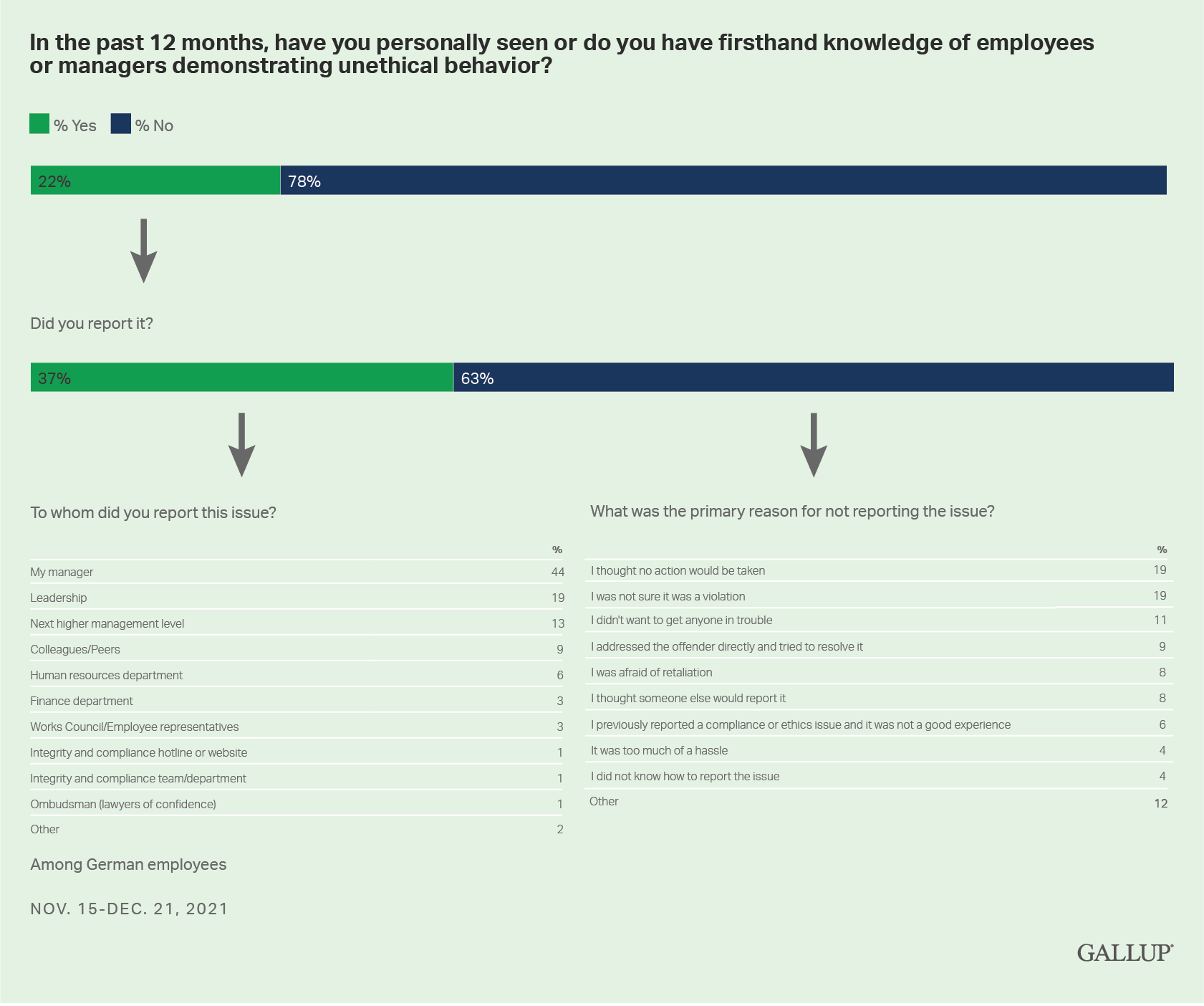Story Highlights
- Widespread consequences can stem from even a few unreported violations
- Employees stay silent about violations when they expect inaction
- Managers' behavior creates a culture of integrity for their team
Swiss financial services giant Credit Suisse recently announced that it missed red flags that could have alerted it to the alleged fraud perpetrated by its former -- and now bankrupt -- investment partner, Greensill Capital. Those missed signals cost Credit Suisse $10 billion in investor funds it can't regain, as well as $43 million in pay from the 10 people it fired, along with a restructuring of its entire asset management arm.
Credit Suisse is not alone. Many other businesses around the world and throughout Germany are dealing with the same financial fallout -- all because, according to Credit Suisse, a tiny handful of managers and employees failed to "behave appropriately."
This probably comes as no surprise to the one in five German employees (22%) who say they have personally seen or have firsthand knowledge of unethical workplace behavior, according to Gallup research conducted in late 2021.
What may surprise their leaders is that the majority of those employees (63%) say they did not report the inappropriate behavior they witnessed. Gallup data indicate it's primarily because those employees didn't trust their company to do the right thing or weren't sure what the right thing was. In any case, most of the German employees who saw red flags walked on by.
Those workers missed a chance to gain clarity and reassurance from their boss. They lost an opportunity to gain trust in -- and from -- their leaders. Some of them missed the moment to head off a crisis.
Perhaps they didn't think their culture expected it.

Alt text: Bar chart. In the past 12 months, have you personally seen or do you have firsthand knowledge of employees or managers demonstrating unethical behavior? Among German employees, 22% say yes and 78% say no. Among those who say yes, 37% say they reported the issue and 63% say they did not.
Managers Are Responsible for Their Team Culture
It must be said that we are all responsible for our own behavior, regardless of job title or hierarchical level. Nonetheless, managers create their team culture, and integrity is a cultural trait.
Managers instill that trait with their own behavior. By demonstrating that which is acceptable and unacceptable, managers set the tone and an example that team members follow. Most German managers aren't especially good role models; only about four in 10 employees strongly agree that their manager "demonstrates behavior of high integrity and ethics."
If a manager clocks in and scrolls social media for half an hour every morning, employees will learn that dishonesty and idleness are permitted. Managers who discuss company or client information in public places prove that confidentiality is not a high value and that employees can be lax with sensitive information. If a manager takes credit for an employee's work, or insists that employees work too many hours (which can be unlawful in Germany), people interpret that behavior as acceptable in their workplace culture.
Perhaps that's one reason so few employees report violations. If they don't see their manager modeling integrity, they aren't as motivated to report bad behavior. Indeed, 19% of employees who say they kept silent about a compliance violation did so because they believed nothing would come of it. Another 18% say they kept silent in fear of retaliation (8%), because they didn't know how to report the issue (4%) or because they'd had an unpleasant reporting experience in the past (6%).
By demonstrating that which is acceptable and unacceptable, managers set the tone and an example that team members follow.
Fortunately, managers can promote ethical behavior effectively when they:
- noticeably model integrity by making examples of themselves
- regularly discuss ethics and integrity with their team, articulating their decisions and actions so employees can learn from them
- respond appropriately and promptly to unethical behavior, using compliance rules and corporate cultural aspirations as their guide
When managers practice these behaviors, Gallup finds that employees are likelier to credit their coworkers with high standards of integrity. They're also more likely to say their company is honest with customers, less likely to say they don't break rules at work to reach their goals and less likely to report witnessing unethical behavior in the workplace.
Put simply, managers who treat their employees fairly and respectfully contribute to an environment in which employees treat each other fairly and respectfully.
Talking About Integrity Changes Worker Perceptions
Nineteen percent of German workers who have witnessed wrongdoing say they didn't report the issue because they weren't sure it was a violation. That's the same percentage as those who did know it was a violation but thought no action would be taken.
Such employees clearly lack confidence in their judgment or their manager's response, and no wonder: Only 30% of employees strongly agree that their team regularly discusses "questions about ethics and integrity that are relevant to our jobs."
Those regular discussions are essential. In conversation, managers and employees can clarify the nuances and function of their company's compliance rules in ways relevant to their work. When compliance is a common topic, employees can learn the why and the how of the rules in context, can debate and define acceptable behaviors, and can get some practice reporting potential issues.
Employees may also develop a sense of responsibility for their culture as a result. A fifth of employees who have seen a violation say they held their tongue because they thought someone else would report the incident (8%) or because they didn't want to get anyone in trouble (11%). Whether those decisions stemmed from an overabundance of compassion, a fear of social isolation or just plain negligence, those employees don't feel encouraged to act or protect the integrity of their workplace.
Talking about ethics calibrates employees' moral compass toward action and teaches workers what to report and to whom. Leaders and managers who make sure employees understand confidential reporting procedures and follow through on reported incidents prove that employees' words matter and will spark change. Then, when problems arise and employees' integrity is tested, they can confidently and competently address red flag situations.
Consequence Management
That creates higher standards of behavior -- and deeper trust. Among workers who say they have reported a violation, almost half (44%) say they chose to talk to their manager about it. Among all workers, an almost equal percentage (45%) strongly agree that their manager "reacts appropriately to behavior that is unethical and does not show integrity." When people aren't held accountable, especially when those people are managers, teams learn that compliance rules are enforced arbitrarily or not at all.
That erodes integrity and trust in a team. It also encourages carelessness. If nothing is done about an employee who shouts at a colleague -- or worse, discriminates against one -- cutting ethical corners won't seem to have consequences.
Ironically, a lack of accountability may cause employees to be more risk averse. That may sound like good moral judgment -- but calculated risk-taking and rule-breaking are inherent to agile process and innovation. Employees must know where the red line is to create useful products and processes. When they don't, they limit themselves and their company.
Or they hide their mistakes. Innovation-friendly cultures use positive error management so people can learn from errors to avert future problems. That allows employees to calculate risks properly and remain compliant. When employees aren't sure where the red line is, or the consequences of their actions, they can't rely on positive error management.
When compliance is a common topic, employees can learn the why and the how of the rules in context, can debate and define acceptable behaviors, and can get some practice reporting potential issues.
It's incumbent on managers to prevent bad behavior by properly holding people accountable. Appropriate and consistent consequences show people where the red lines are. And to promote creativity and agility, managers need to show people where the dotted lines are -- and when and how to cross them for the right reasons.
Move More Employees to the Right Side of the Red Line
Those lines are made clear by managers who model ethical behavior, discuss workplace integrity and manage consequences. Those managers exemplify culture, which directs employee behavior. And the Gallup data show that many German business cultures may be directing workers to do nothing about wrongdoing. Those kinds of cultures encourage workers to look the other way, distrust their company and let red flags go unreported. It's by no means just a German thing, though -- Gallup recently found that 23% of U.S. workers say they have seen or been aware of unethical behavior in their workplace in the past 12 months, with 40% choosing to report it.
Yet, importantly, the majority of employees are on the right side of the equation. Most workers haven't witnessed wrongdoing.
Still, only 10 people lost their jobs at Credit Suisse for "behaving inappropriately." That's a very small number of people to cause a titanic amount of financial, organizational and reputational damage. While leaders may take comfort in knowing that most employees are ethical and value integrity, it pays to remember that just a few bad apples can cost a business dearly.
The task for German managers, therefore, is to move the rest of their workers into the ethical, responsive category that most employees already inhabit. Managers can achieve that by following Gallup's formula of modeling integrity, regularly discussing ethics and responding promptly to unethical behavior.
And they should keep in mind their responsibility for creating their team culture. In the end, managers who actively enable ethics inspire workplace integrity -- and their companies have far fewer red flags to report.
Build an organizational culture that makes it easy to do the right thing.
- Discover how your company culture can be a competitive advantage.
- Read more about how to build a culture that drives performance.





